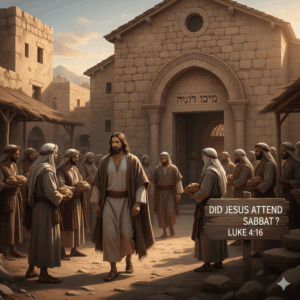Did Jesus practice the Sabbath?
Yes, Jesus kept the Sabbath, regularly participating in synagogue worship and teaching on the seventh day, as documented in the Gospels.
His observance was consistent and honored the biblical command to set the Sabbath apart as holy. While maintaining this practice, Jesus taught that the Sabbath was intended for humanity’s benefit, prioritizing acts of compassion and mercy rather than rigidly enforcing rules.
Scriptural Evidence of Jesus Observing the Sabbath
The Gospels make it clear that Jesus regularly observed the Sabbath as it was customary for a Jewish man in first-century Palestine. The most explicit evidence is found in passages such as Luke 4:16:
“And he came to Nazareth, where he had been brought up: and, as his custom was, he went into the synagogue on the sabbath day, and stood up for to read. ”
This text demonstrates that not only did Jesus attend synagogue services on the Sabbath, but he did so habitually, indicating sustained observance.
Other references (e.g., Mark 1:21; Luke 6:6) confirm this pattern, showing Jesus present in the synagogue teaching and reading scripture on the Sabbath.
His participation in communal worship and scripture reading positions Him firmly within the practice of Sabbath-keeping.
Jesus’s Actions on the Sabbath
Gospel accounts further show Jesus performing a range of activities on the Sabbath day, often sparking debate and conflict with religious authorities.
The most notable among these are His acts of healing.
Examples include:
Healing a man with a withered hand (Mark 3:1-6; Matthew 12:9-14; Luke 6:6-11)
Healing a crippled woman (Luke 13:10-17)
Healing a man suffering from dropsy (Luke 14:1-6)
Healing at the pool of Bethesda (John 5:1-18)
Restoring sight to a blind man (John 9:1-16)
In each incident, the healing itself was considered by some religious leaders to be a violation of Sabbath rules, which forbid “work.”
However, Jesus never healed for personal benefit or profit, but rather as acts of compassion and restoration.
Additionally, Jesus’s disciples were criticized for plucking and eating grain on the Sabbath (Mark 2:23-28)—an act considered by some as unlawful harvesting.
Jesus defended his disciples and himself, suggesting his approach to the Sabbath differed fundamentally from the prevailing legalistic interpretations.
Despite his radical positioning, these actions consistently occurred within the context of Sabbath day, not in open defiance of the Sabbath’s existence.
Rather, they represented a reframing of what constituted proper Sabbath observance.
Jesus’s Teachings and Interpretations of the Sabbath
Alongside his actions, Jesus’s teachings offer critical insight into His view of the Sabbath. One definitive statement comes from Mark 2:27-28:
“And he said unto them, The sabbath was made for man, and not man for the sabbath:
Therefore the Son of man is Lord also of the sabbath.”
Here, Jesus interprets the Sabbath as intended for human well-being, not as an oppressive burden.
Healing and acts of mercy, in his teachings, align perfectly with the Sabbath’s original purpose—a day of rest, restoration, and worship.
In Matthew 12:11-12, Jesus argues:
“And he said unto them, What man shall there be among you, that shall have one sheep, and if it fall into a pit on the sabbath day, will he not lay hold on it, and lift it out?
How much then is a man better than a sheep? Wherefore it is lawful to do well on the sabbath days.”
This teaching reframes Sabbath-keeping from meticulous rule-following to participation in God’s compassion. Jesus does not discard the Sabbath, but critiques interpretations that miss its intended grace and benefit.
Therefore, Jesus’s practice of the Sabbath was not characterized by disregard, but by a return to its essence as a gift to humanity—a day to focus on God and neighbor.
Controversies and Accusations
Jesus’s Sabbath actions prompted repeated controversy. The Gospels record multiple confrontations between Jesus and the Pharisees or other religious teachers, centered on the lawfulness of His Sabbath activity.
After he healed a man with a withered hand, Mark 3:6 says the Pharisees began plotting against Him, considering his actions blatant violations.
In John 5:16, Jesus’s healing at the pool led Jews to persecute Him “because he was doing these things on the Sabbath.”
John 9:16 notes some Pharisees proclaimed, “This man is not from God, for he does not keep the Sabbath,” due to his healing of the man born blind.
Yet Jesus consistently answered such accusations by appealing to scripture, reason, and the core values of the law—showing that acts of mercy and necessity were fully compatible with Sabbath observance.
He cited Old Testament examples (e.g., David eating consecrated bread, priests working in the temple), demonstrating that the law was intended for life, not for legalistic entrapment (Matthew 12:3-7).
This pattern confirms that while Jesus did challenge popular interpretations, He did not reject the Sabbath itself, but confronted those who used it to deny compassion.
Conclusion
Did Jesus practice Sabbath? The Gospel accounts present a clear answer: Yes, Jesus did practice the Sabbath.
He attended synagogue, read scripture, and refrained from prohibited regular work.
His distinctive contribution was to interpret Sabbath observance through the lens of mercy, restoration, and human need, rather than mere legal compliance.
Jesus’s practice was to honor the Sabbath’s intent—a day to worship, heal, restore, and show compassion.
He fulfilled the Sabbath, not by abolishing it, but by bringing it back to its divine purpose.
Thus, the evidence shows that Jesus practiced the Sabbath faithfully, while calling His followers to a deeper understanding of its true meaning.
My Letter To A Sunday Keeper – Sabbath Documentary

The Days of Noah – Powerful Documentary (Video Format)

Bible Studies – Written Format







